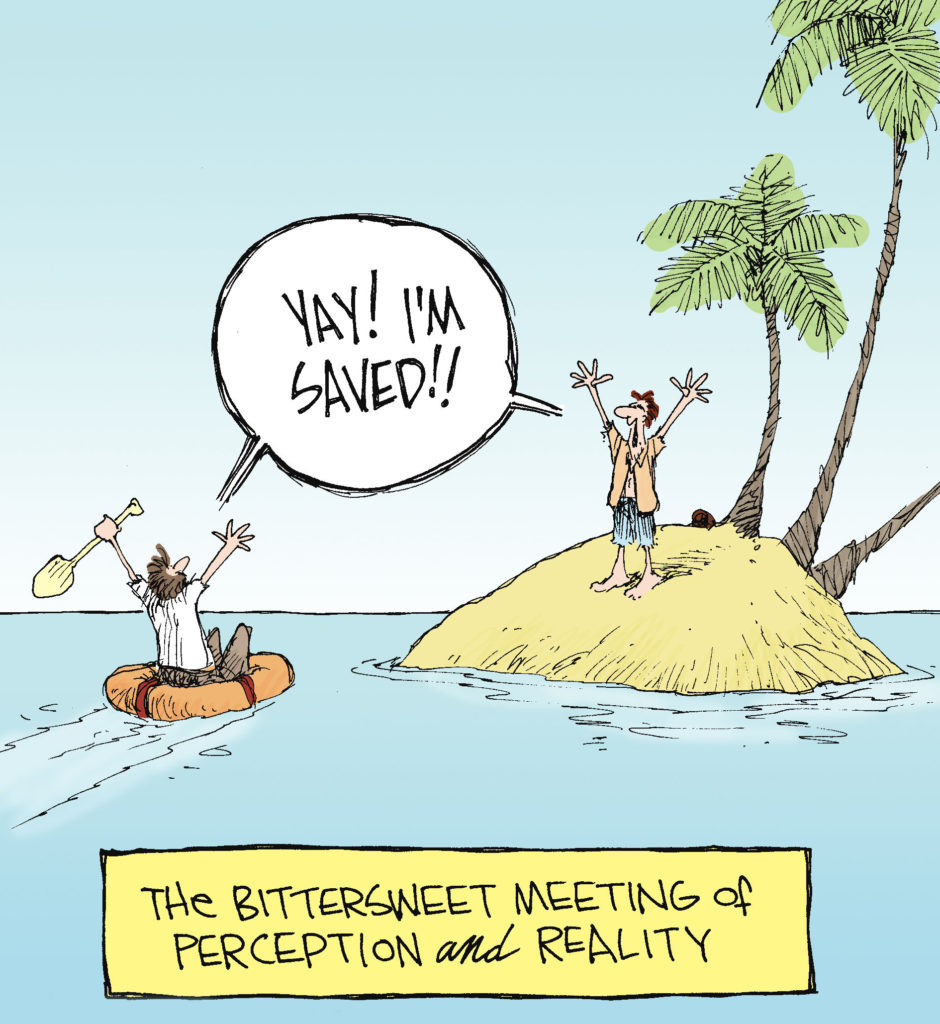
Be careful how you interpret the world, it is like that. Eric Heller
Perception is reality.
I have always resisted this thought, though I believe it is true, though it is not.
Reality is immutable so our perception of it should be immaterial. (Thinking that an apple is an orange doesn’t change the molecular structure of the apple.) And yet, each of us comprehends and interprets reality through our personal, unique lenses. We often mistake our perception for reality.
Sometimes, we may see a small and accurate facet of reality but it is incomplete, which leads to correct but limited perceptions. [The Blind Men and the Elephant parable illustrates this conundrum.]
How can we negotiate this tenacious fallacy?
1. As you relate to other people, constantly remind yourself of how pervasive the perception vs reality challenge is, and try to manage it.
Anticipate how things may be perceived by others and try to present them clearly so that reality has a chance to prevail. Try to understand how people are perceiving things so that you can correct misconceptions.
2. Don’t let your perceptions define your reality.
Douglas Adams reminds us that “Everything you see or hear or experience is specific to you. You create a universe by perceiving it, so everything in the universe you perceive is specific to you.” Continually scrutinize your thoughts and convictions in order to verify their veracity. Pursue truth; avoid and forsake a mere perception of the truth. As Daniel Moynihan famously said, “Everyone is entitled to his own opinion, but not his own facts.”
3. Leaders, this topic underscores how challenging it is to communicate well.
When communicating to your stake holders, always assume that you are not as good at communicating as you think you are.
Tom Peters writes, “The biggest problem with leadership communication is the illusion that it has occurred. A 2002 survey of 1,104 business professionals showed that while 86% of their leaders feel that they are great communicators, only 17% believe their leaders are, indeed, effective communicators.”
Good communication will help align perception with truth.
“Reality is merely an illusion, albeit a very persistent one.” – Albert Einstein
[reminder]What are your thoughts about this essay?[/reminder]
[callout]12 best books I read last year – book 3 of 12
In The Kingdom of Ice – The Grand and Terrible Polar Voyage of the USS Jeannette – Hampton Sides
In 1879 a ship set sail from San Francisco. Her crew hoped to be the first humans to reach the North Pole. This story is a testimony to the incredible perseverance embedded in the human psyche. Click here for more information from Amazon.[/callout]

Don, this is a very interesting paper. Good job. You made me think…again! And, I know that’s one of your main objectives in this!
This will help me to be more critical of my thoughts before they race down toward my tongue!
Regards, from Aggieland,
Bill
Thanks, Bill. You’re right – my main goal in writing these posts is to encourage people to think about important thoughts, not just persuade them to think as I do. I appreciate our friendship. Don
Thanks Don for the well crafted article and a good reminder of the challenges of communicating what is in our own head to others with clarity and precision with hopes that they same meaning will be imparted to the “hearers” too. Even though that may have little to do with Truth and Reality, let alone the hand of God who is operating on the behalf of the Believer and yet may not be seen clearly (or believed) as the daily events unfold or may seem to be at odds with our perception of reality.
I would offer that in your third point that the impact of Culture and Multi-lingua interactions add to the challenge of clearly communicating to the receiver of the message (not to mention the challenge to the mono-linguistic speaker in preparing the message), whether they are leaders to their firm or team, a church, a social group or even a world leader that is communicating to his nation and the nations that he is speaking to. Culture, language and ethnicity and upbringing all play an important role in how the message is received and understood.
And finally, the notion and confidence that a speaker has the intent and desire to speak truth is one that requires constant evaluation and scrutiny. Marketing organizations and firms are hired for their persuasive communications ability laced with a gift to convince that their messaging is “truth”. Even Peter, tough not a marketer, found himself in a position of thinking he was communicating truth and perfect advice, spoken with confidence and assurance to Jesus only to find out that he had been subtly deceived and in error in his thoughts of what “truth” was and received correction for the deception that he acted on.
Thanks for sharing this topic and reminding us of some of the challenges associated with “Perception vs reality”.
Blessings,
Blair
Blair, thanks for proffering such a well-thought-out reply. I would enjoy further conversation. Where do you live and what do you do?
Don